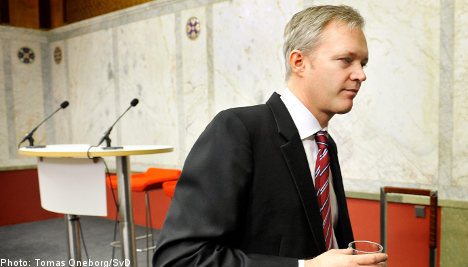“No matter how you look at it, this is bad news for the government. You can’t really put a good spin on it,” Nicholas Aylott, a political scientist at Södertörn University in Stockholm, tells The Local.
“It adds to the sense that the government is facing a mounting set of problems and doesn’t have the wherewithal to get a grip on the political agenda.”
Tolgfors’s resignation was announced during a Thursday press conference during which prime minister Fredrik Reinfledt praised Tolgfors for his efforts in overseeing the transformation of the Swedish military in light of stinging budget cuts which prompted the defence minister’s predecessor to quit in protest in 2007.
However, both Reinfeldt and Tolgfors also acknowledged that the still unfolding scandal surrounding a secret plan hatched by officials at Sweden’s Defence Research Agency (Totalförsvarets forskningsinstitut, FOI) to help build a weapons plant in Saudi Arabia also played a role in Tolgfors’s decision.
According to Tolgfors, the media attention surrounding the scandal, first revealed by Sveriges Radio (SR) in early March “hastened and facilitated” a move he said he’d been considering since the autumn of 2011.
Following the announcement, there was much speculation in the Swedish media regarding whether Tolgfors had really acted on his own accord or had been forced out by Reinfeldt.
“It’s difficult to say whether he was sacrificed or decided he just couldn’t put up with it anymore since we know so little about the details of the affair,” says Aylott.
“Regardless, it’s difficult to see how he could survive in the role considering the continued revelations in the press. His position was becoming more and more untenable.”
While Tolgfors’s departure may provide Reinfeldt with some breathing room politically, Aylott expects the prime minister to have a rough road ahead as he attempts to placate rising frustration among the smaller parties in the governing centre-right Alliance government and get his political agenda back on track.
“[The scandal] illuminates a number of other deep-seeded problems facing the Alliance and adds to a continued loss of momentum,” says Aylott
“The fact is, it’s a minority government and they find themselves in a tricky situation. They have little in the way of a plan for how to deal with it other than to hang on until the next election and hope for a majority, something that looks increasingly unlikely considering recent events.”
Aylott adds that aspects of the secret deal with Saudi Arabia are “eyebrow-raising, to say the least”, such as revelations that FOI allegedly borrowed massive amounts of cash from military intelligence agency MUST in order to finance a shell company to manage the dubious venture.
In other ways, however, the behaviour of officials at FOI in apparently looking to skirt the rules in order to pursue a partnership with the Saudis is simply indicative of an agency under pressure and a “sign of weakness” for the Swedish defence industry.
“The Swedish defence industry has been under stress because of drastic reductions in demand for equipment and services from the Swedish military and has had to look for external solutions,” he said
“That kind of pressure can bring about ‘entrepreneurial’ behaviour, not to mention a collective loss of judgment.”
Despite the additional hardships facing Reinfeldt as he awaits more potentially damning details which could be revealed by numerous probes now underway into FOI’s actions surrounding the Saudi deal, Aylott believes the prime minister can be thankful that the political opposition hasn’t been more ruthless in blaming the government for the scandal.
“One reason this hasn’t been as explosive politically is that all the parties have had involvement with it at some level,” he explains, pointing out that the Memorandum of Understanding (MoU) under which the project was pursued was actually signed in 2005 under the then Social Democrat-led government.
In addition, new Social Democrat head Stefan Löfven is also sympathetic to the importance of keeping the Swedish defence industry afloat, both in terms of jobs and exports.
“Löfven may therefore be more hesitant to openly criticize the government over the matter and the opposition has perhaps felt constrained from going for the government’s throat more directly,” says Aylott.
“At least that’s one interpretation as to why they’ve given the government a relatively easy ride on this so far.”
David Landes



 Please whitelist us to continue reading.
Please whitelist us to continue reading.
Member comments